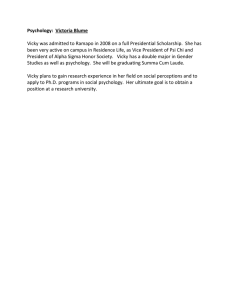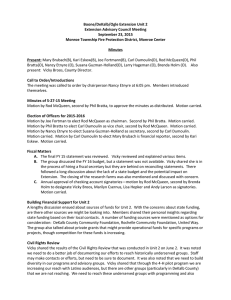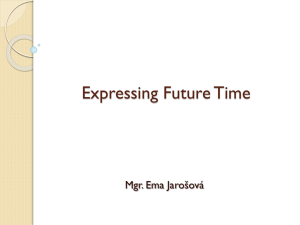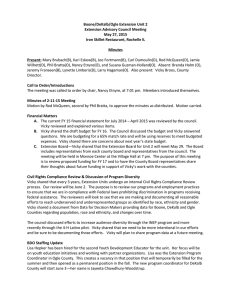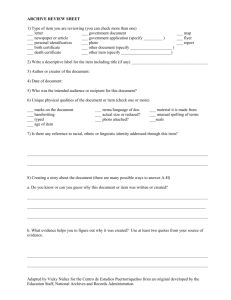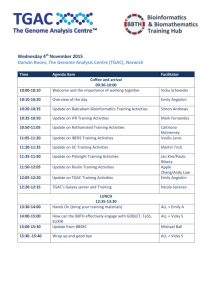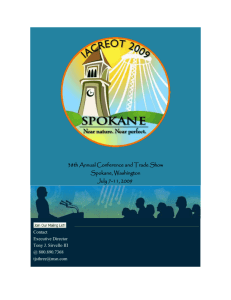Boone/DeKalb/Ogle Extension Unit 2 Extension Advisory Council Meeting February 18, 2016—6:00 pm
advertisement
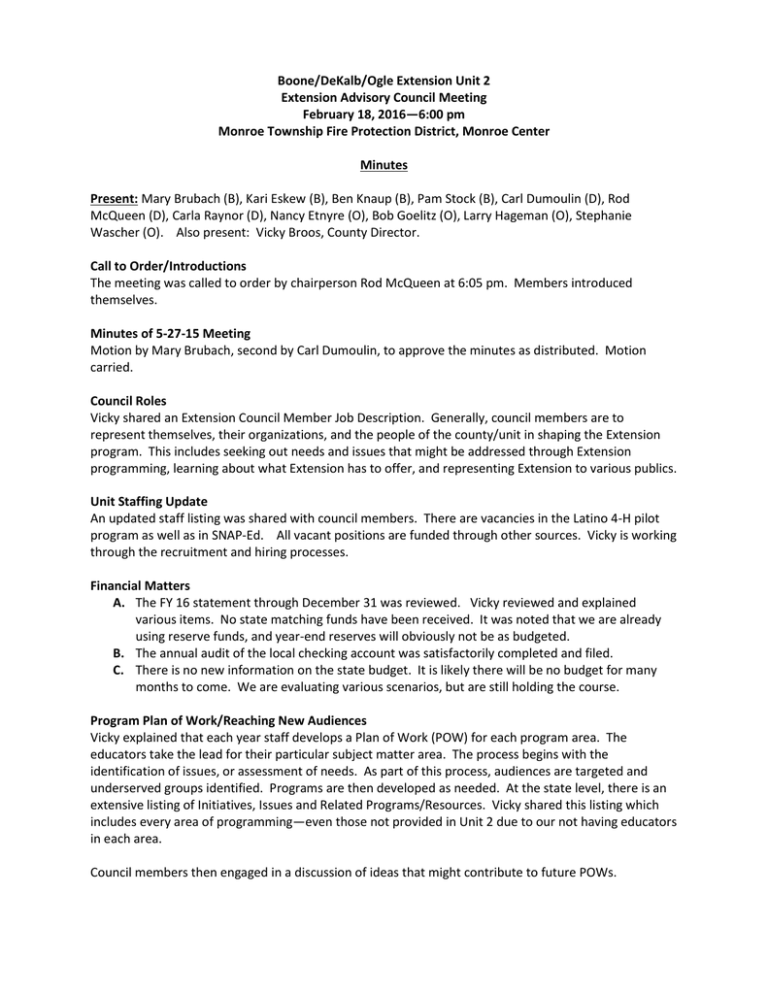
Boone/DeKalb/Ogle Extension Unit 2 Extension Advisory Council Meeting February 18, 2016—6:00 pm Monroe Township Fire Protection District, Monroe Center Minutes Present: Mary Brubach (B), Kari Eskew (B), Ben Knaup (B), Pam Stock (B), Carl Dumoulin (D), Rod McQueen (D), Carla Raynor (D), Nancy Etnyre (O), Bob Goelitz (O), Larry Hageman (O), Stephanie Wascher (O). Also present: Vicky Broos, County Director. Call to Order/Introductions The meeting was called to order by chairperson Rod McQueen at 6:05 pm. Members introduced themselves. Minutes of 5-27-15 Meeting Motion by Mary Brubach, second by Carl Dumoulin, to approve the minutes as distributed. Motion carried. Council Roles Vicky shared an Extension Council Member Job Description. Generally, council members are to represent themselves, their organizations, and the people of the county/unit in shaping the Extension program. This includes seeking out needs and issues that might be addressed through Extension programming, learning about what Extension has to offer, and representing Extension to various publics. Unit Staffing Update An updated staff listing was shared with council members. There are vacancies in the Latino 4-H pilot program as well as in SNAP-Ed. All vacant positions are funded through other sources. Vicky is working through the recruitment and hiring processes. Financial Matters A. The FY 16 statement through December 31 was reviewed. Vicky reviewed and explained various items. No state matching funds have been received. It was noted that we are already using reserve funds, and year-end reserves will obviously not be as budgeted. B. The annual audit of the local checking account was satisfactorily completed and filed. C. There is no new information on the state budget. It is likely there will be no budget for many months to come. We are evaluating various scenarios, but are still holding the course. Program Plan of Work/Reaching New Audiences Vicky explained that each year staff develops a Plan of Work (POW) for each program area. The educators take the lead for their particular subject matter area. The process begins with the identification of issues, or assessment of needs. As part of this process, audiences are targeted and underserved groups identified. Programs are then developed as needed. At the state level, there is an extensive listing of Initiatives, Issues and Related Programs/Resources. Vicky shared this listing which includes every area of programming—even those not provided in Unit 2 due to our not having educators in each area. Council members then engaged in a discussion of ideas that might contribute to future POWs. It was suggested that we might look at programs provided over a longer period—what has been our participation over time? Is it consistent in one program area? Are we seeing any changes in reaching underserved audiences? Have we looked at our “hits” on our website? What are people interested in? It was noted we do a good job of adapting statewide programs to local conditions (e.g. growing conditions). Are the programs we are doing “multidimensional?” Can the content be accessed in multiple ways—are we repurposing the content? Master Gardener and Master Naturalist programs allow us to use volunteers to teach and seek out opportunities. Can we expand on this? It was noted there is a digital divide with Latino audiences. They may have smartphones, but not other technology. We need to keep that in mind when working with this underserved group. How can we best reach them? We also need to be able to provide materials in Spanish to Latino adults. Many do not speak or read English. What other organizations have done needs assessments that we can access? Examples include Health Departments, Economic Development groups. Are there needs assessments for some of the underserved populations? For example, has LULAC done an assessment for the Latino population—is it localized? Evaluate how we are networking with other organizations and agencies. It was noted that youth, primarily at risk youth, are not being taught soft skills and job skills. Vicky shared that having a second Youth Development Educator will allow us to place more emphasis on these issues moving forward. Family dynamics also creates issues for programming that need to be considered. One idea for youth programming is “maker space.” The group also talked about the need to change perceptions about 4-H, but first our program needs to begin reaching a more diverse audience. Vicky shared the Expansion & Review Committee is working with staff to develop goals and objectives in this area. Council members were encouraged to engage in ongoing efforts to gather input that may be helpful to better serving our counties and people. Extension State Advisory Council Nancy Etnyre is currently a Region 1 representative on the Extension State Advisory Council which operates in a similar role as our local council, except they advise the administrative team on campus. Nancy shared that at their recent meeting; there was much talk about the lack of a state budget and what individual advocates for Extension might be able to do. Nancy shared a handout they were given titled “How to Be an Effective Advocate with Legislators.” She noted that the main message is to make efforts to connect with legislators in a positive way. Open channels of communication. She encouraged council members to personally communicate with their legislators through letters, visits, and calls. They like hearing from their constituents but have a lot going on, so be brief. It’s always a good practice to leave something behind—a flier, one page note, etc. And don’t forget to thank them for their time. Adjourn—There being no further business to come before the council, motion by Mary Brubach, second by Kari Eskew, to adjourn. Motion carried. Meeting adjourned at 7:30 pm.
